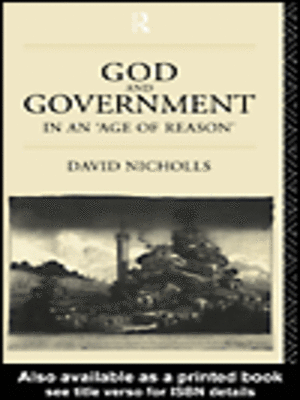
Sign up to save your library
With an OverDrive account, you can save your favorite libraries for at-a-glance information about availability. Find out more about OverDrive accounts.
Find this title in Libby, the library reading app by OverDrive.



Search for a digital library with this title
Title found at these libraries:
| Library Name | Distance |
|---|---|
| Loading... |
In this companion volume to Deity and Domination, David Nicholls broadens his examination of the relationship between religion and politics. Focusing on the images and concepts of God and the state predominant in eighteenth-century discourse, he shows how these were interrelated and reflect the language of the wider cultural contexts.
Nicholls argues that the way a community pictures God will inevitably reflect (and also affect) its general understanding of authority, whether it be in state, in family or in other social institutions. Much language about God, for example, has a primarily political reference: in psalms, hymns and sermons God is called king, judge, lord, ruler and to him are ascribed might, majesty, dominion, power and sovereignty. But if political rhetoric is frequently incorporated into religious discourse, the reverse is also true: many key concepts of modern political theory are secularised theological concepts. In his consideration of this important and neglected relationship Nicholls sheds new light on religion and politics in the eighteenth century.
Nicholls argues that the way a community pictures God will inevitably reflect (and also affect) its general understanding of authority, whether it be in state, in family or in other social institutions. Much language about God, for example, has a primarily political reference: in psalms, hymns and sermons God is called king, judge, lord, ruler and to him are ascribed might, majesty, dominion, power and sovereignty. But if political rhetoric is frequently incorporated into religious discourse, the reverse is also true: many key concepts of modern political theory are secularised theological concepts. In his consideration of this important and neglected relationship Nicholls sheds new light on religion and politics in the eighteenth century.







